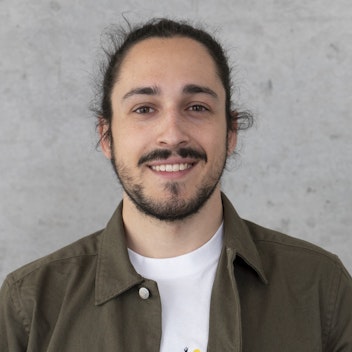
The Digitalization process in Italy: the impact on Regional Autonomy
 Elia Aureli
Elia Aureli
2022, March 2nd, Yvan Colonna, a Corsican nationalist serving a life sentence for the 1998 assassination of Corsica’s top regional official Claude Érignac, is assaulted in the sports hall of the prison of Arles by a fellow detainee. 21st of March, 19 days following his attack and after a long coma, he dies at a hospital in Marseille. The reaction of Corsican public opinion and, naturally, of Corsican nationalists is immediate. Riots burst out across the main cities of the island and protesters march and clash with French security forces chanting “Libertà!” and “Statu francese assassinu”, blaming France for what happened, to the point of breaking into the courthouse of Ajaccio, and attempting to set it on fire.
Indeed, Colonna was not an ordinary detainee, but rather, the symbol of the Corsican nationalist armed struggle against the French state. Born in Corsica and partly raised in mainland France among the continentaux, the son of a Corsican father and a Breton mother, Yvan Colonna moved to his fatherland to become a goatherd after its university years and a brief career as physical education teacher. On the island, a confrontation between state security forces and the Fronte Naziunale di Liberazione di a Corsica (FLNC), the better-organized armed separatist group of the island, was playing out. Young Colonna, just like other youngsters of the time, joined the ranks of the island’s paramilitary separatist group. Soon, he was at the forefront of the armed conflict, being accused of the the execution of Claude Érignac, the French state’s top official in Corsica introduced earlier - although he kept his innocence to the end. Colonna, believed to be somewhere overseas, was later found in a stone shepherd hut in inland Corsica; being France’s most wanted man, he was then arrested and convicted with a life sentence.
However relevant Colonna’s participation in the armed struggle carried by Corsican separatists may have been, it is not the Man himself that is of our interest, but rather, the implications that his murder generated in the public opinion of Corsica, especially against the backdrop of the past presidential elections. Indeed, it is not only the explosive reaction of the Corsicans in reaction to the murder of Colonna that should be considered noteworthy per se. Rather, from an analytic viewpoint over the political environment of the island, this piece of news also strangely superimposes the most recent developments of Corsican electoral history.
Now, before going to the core of this reasoning, it is useful to take a brief look at the history of this rocky piece of land. The ethnogenesis and the inhabitation process of Corsica is inarguably intriguing and reveals the roots of some features of Corsica’s contemporary politics. Populated since the Meso- and Neo-lithic by populations hailing from today’s Liguria and Tuscany, the Corsi, who give the name to today’s inhabitants of the island, were allegedly descended from ancient Ligurian lineage. Etruscans spilt over Corsica and sparse Greek and Carthaginian colonies appeared before the definitive Roman conquest, and subsequent Romanization. After Imperial dismemberment, Corsica was governed and settled by Pisans, and until the XVIII century by the Genoese. It is the ethnolinguistic character of Corsicans – strongly related to Sardinians and neighboring peninsular peoples - that explains their alterity with respect to mainland France, shaping the identity on which their claim for cultural recognition and self-rule have arisen. In 1755, once the Genoese were expelled, Pasquale Paoli, U Babbu di a Patria, proclaimed the Corsican Republic, a Corsican Constitution – written in Italian – was introduced, along with a Diet and (manhood) universal suffrage.1 This premature democratic experience was first interrupted by the annexation to the Kingdom of France, and later, paradoxically, by its subjugation to enlightened Revolutionary France in 1796. Thereafter, Corsica became an integral part of France, undergoing the well-known process of assimilation carried by Jacobin France towards its national minorities.
At the turn of the nineteenth and twentieth centuries, nationalist claims started to emerge, albeit at a slow pace. The May 1958 crisis, following the coup in Algeria, inaugurated the rise of Corsican nationalism. Almost twenty thousand pieds-noirs, French citizens repatriated mainly from Algeria, were sent to the island, receiving large extents of arable land along the fertile eastern coast.2 Demographic decline, material impoverishment and the dismantlement of colonial administration (where Corsicans were largely employed), combined with the lack of cultural and linguistic acknowledgment and the clannism of regional politics were the perfect blend for the radicalization of Corsican regionalist claims. In 1976 the most engaged nationalist militants who embraced armed struggle, merged into the FLNC, among them was Edmond Simeoni, the father of Gilles Simeoni, current President of the executive council of Corsica, and the former lawyer of Yvan Colonna. The four-decade long phase of terroristic attacks and intra-factional feud that stained Corsica in blood initiated.
The last decade has seen a slow demilitarization of the FLNC, while, at the electoral level, the support for Corsican nationalists has noticeably increased in the last few years. In 2017’s territorial elections Corsican nationalists, both in their moderate and radical electoral formations, have, for the first time in the electoral history of the island, won more votes than mainstream parties. In 2021’s territorial elections Gilles Simeoni, head of the main (non-independentist) nationalist party Femu a Corsica, was reconfirmed at the lead of the regional executive. The preferences won by Simeoni combined with the votes of the pro-independence nationalist Corsica Libera, Partitu di a Nazione Corsa, and Core in Fronte corresponded to slightly less than 70 per cent of total votes. Even though the new regional executive is now only composed by moderate (therefore non-independentist) nationalists, almost seven out of ten Corsican voters have chosen nationalist forces.
Evidently, the current pro-nationalist stance of the Corsican electorate explains the general turmoil that the murder of Colonna has sparked. Now, what is most interesting from a political analytical stance, is the paradoxical electoral behavior that Corsicans displayed in the last presidential election, where almost 60 per cent of the votes went to Marine Le Pen. Still, it is not only the overall vote for the Rassemblement National (RN) that deserves analysis, but its radical contraposition to the vote made by Corsicans one year ago. Everything turns to be even more paradoxical, if we consider that Gérald Darmanin, Minister of the Interior for Macron’s La République en Marche, in an interview to Corse Matin declared that, if Macron was reelected, they were "prêts à aller jusqu'à l'autonomie" Thus, what explains the Corsican electorate’s overt rejection of Macron at the pools? Perhaps, the vote for Le Pen was only a protest vote. What is certain is that the unionism of the RN does not coincide with the ambitions of the nationalist-dominated Executive Council of Corsica. So, against the emotionally charged background of the Colonna case, there is some evidence that reveals the unsettled rift which exists between the French state and a majority of Corsicans. The fact that independentist leaders have encouraged the nationalist electorate to boycott elections, that more than 39 per cent of voters opted for abstention, and that most electors on the ballot chose Le Pen - despite her ideological opposition to nationalists’ claims - is surely not meaningless. Indeed, it unveils the radical lack of confidence towards French mainstream democratic forces, perhaps the result of the institutional unresponsiveness to Corsican demands. Hopefully, there is not a preset form of territorial organization that must perpetuate in a state forever, thus, isn’t it time for France to update the spirit of Jacobinism?

This content is licensed under a Creative Commons Attribution 4.0 International license.